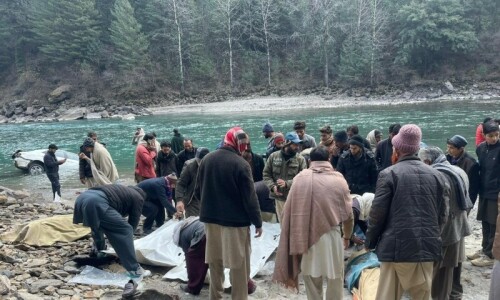Leaving with good memories
 |
| DEAN of Diplomatic Corps honoring envoys and protocol chiefs. (L to R) Tasawar Khan, Daud Danladi, Rodolfo Martin Saravia, Tomvit Jarnson, Moinul Haque and wife. |
As Nigerian High Commissioner Dauda Danladi and Thai Ambassador Tomvit Jarnson are leaving, Ambassador Rodolfo Martin Saravia, the dean of Diplomatic Corps, hosted a traditional lunch reception for the foreign envoys, country representatives of the United Nations agencies and the Foreign Office partners.
Pakistan’s outgoing and incoming chiefs of the protocol attended the event and were given special recognition; Tasawar Khan, who is the new protocol chief and Moinul Haque, who has left, were praised for their good cooperation.
Ambassador Saravia underlined the importance of the role of the protocol chief’s office and staff. In a humorous way, Saravia said if the protocol chief says ‘yes’ or, ‘I will try’, to a request from an envoy, that is enough to know that it is all being done. But if the chief has to say ‘no’, the envoy would know that another avenue had to be sought. He said such plain talk is important even in the diplomatic circles.
In his speech, Dauda Danladi said Nigeria was expecting an increased trade with Pakistan. He thought his country was not well enough known for its good qualities and business possibilities. Upon return home, Danladi said he would take up a political post in the new government. Tomvit Jarnson will retire from the diplomatic service upon completion of his Pakistan assignment, leaving with fond memories and more knowledge to be used in his future work as a consultant and lecturer. “But don’t get too busy”, the dean joked. “We all will come to visit you. I will retire next year and Thailand is top on my holiday list.”
French researcher meets media
 |
| Dr Pascal Boniface talks to mediapersons in Islamabad. |
The French embassy invited renowned French researcher Pascal Boniface to meet journalists in Islamabad. Dr Boniface is scheduled to give lectures at various universities under an ‘Open doors’ programme initiated in collaboration with Alliance Françaises of Lahore and Karachi. His lectures focus on the theme of the changing world order and global crises.
As the founding director of the French Institute for International and Strategic Affairs (IRIS) based in Paris, Dr Boniface has published several articles in international and strategic reviews and is an authority on international relations.
Initiating the informal discussion with the interesting premise that there have been few ruptures in the international order in recent centuries – the last dramatic change occurring with the end of the Cold War when the bipolar world order collapsed – Dr Boniface went on to answer questions dealing with the French position on the expansion of the United Nations Security Council to possible resolution of the Syrian crisis.
Dr Boniface was convinced that while the unipolarity of the world order was crumbling, the process was one of evolution and not revolution. Slow change, occurring due to technological advances which have practically universalised access to information and the internet, globalisation and different global entities emerging which control and varied assets have set the world toward multi-polarisation.
While many of the questions Dr Boniface was asked would have been better addressed to a clairvoyant, the common thread in his answers was the need for a dialogue and representative bodies engaged in conflict management and resolution. Dr Boniface also said if a republican was elected in the United States, the country’s international policies would go back to being based on the assumption the world was unipolar.
— Text and photo by Atle Hetland, Shahbaz Chaudhry & Syeda Shehrbano Kazim
Published in Dawn, September 20th, 2015
On a mobile phone? Get the Dawn Mobile App: Apple Store | Google Play













































Dear visitor, the comments section is undergoing an overhaul and will return soon.